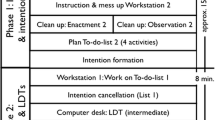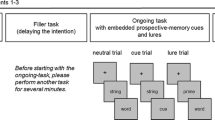Abstract
Implementation intentions are detailed and systematic plans that are developed during intention formation. We compared two different implementation intentions to standard event-based prospective memory instructions using three different kinds of intentions. Two of these intentions involved nonfocal cues whereas the remaining intention was about specific, focal cues. Implementation intentions dramatically increased detection performance for the nonfocal intentions. Because the exact cues could not be specified during intention formation, we argue that cue salience and that strengthening the cue to target action association are not very viable mechanisms to explain all instances of the beneficial consequences of forming implementation intentions.

Similar content being viewed by others
Notes
We also analyzed task interference for the word trials in the temporal vicinity of successful cue detection (i.e., within ten total lexical decision trials before cue detection). The reaction times for these trials were statistically equivalent to the overall latencies across all nine conditions in the three experiments that we have reported here. This outcome of latencies in the vicinity of cue detection replicates our previously published work that also found no such differences (i.e., Hicks et al. 2005). However, we acknowledge that there is one report that may differ in this conclusion (see West, Krompinger, & Bowry, 2005).
References
Chasteen, A. L., Park, D. C., & Schwarz, N. (2001). Implementation intentions and facilitation of prospective memory. Psychological Science, 12, 457–461.
Cohen, A. L., & Gollwitzer, P. M. (2008). The cost of remembering to remember: Cognitive load and implementation intentions influence ongoing task performance. In M. Kleigel, M. A. McDaniel, & G. O. Einstein (Eds.), Prospective memory: Cognitive, neuroscience, developmental, and applied perspectives (pp. 367–390). New York: Taylor & Francis Group/Lawrence Erlbaum Associates.
Cohen, J. (1988). Statistical power analysis for the behavioral sciences (2nd ed.). Hillsdale: Lawrence Erlbaum Associates.
Einstein, G. O., & McDaniel, M. A. (2005). Prospective memory: Multiple retrieval processes. Current Directions in Psychological Science, 14, 286–290.
Einstein, G. O., McDaniel, M. A., Thomas, R., Mayfield, S., Shank, H., Morrisette, N., et al. (2005). Multiple processes in prospective memory retrieval: Factors determining monitoring versus spontaneous retrieval. Journal of Experimental Psychology: General, 134, 327–342.
Einstein, G. O., McDaniel, M. A., Williford, C. L., Pagan, J. L., & Dismukes, R. K. (2003). Forgetting of intentions in demanding situations is rapid. Journal of Experimental Psychology: Applied, 9, 147–162.
Ellis, J. A. (2008). Ten years on: Realizing delayed intentions. In M. Kleigel, M. A. McDaniel, & G. O. Einstein (Eds.), Prospective memory: Cognitive, neuroscience, developmental, and applied perspectives (pp. 1–27). New York: Taylor & Francis Group/Lawrence Erlbaum Associates.
Ellis, J., Kvavilashvili, L., & Milne, A. (1999). Experimental tests of prospective remembering: The influence of cue-event frequency on performance. British Journal of Psychology, 90, 9–23.
Ellis, J., & Milne, A. (1996). Retrieval cue specificity and the realization of delayed intentions. Quarterly Journal of Experimental Psychology, 49, 862–887.
Gollwitzer, P. M. (1999). Implementation intention: Strong effects of simple of plan. American Psychologist, 54, 493–503.
Gollwitzer, P. M., & Schaal, B. (1998). Metacognition in action: The importance of implementation intentions. Personality & Social Psychology Review, 2, 124–136.
Guynn, M., & McDaniel, M. A. (2007). Target pre-exposure eliminates the effect of distraction on event-based prospective memory. Psychonomic Bulletin & Review, 14, 484–488.
Hicks, J. L., Marsh, R. L., & Cook, G. I. (2005). Task interference in time-based, event-based, and dual intention prospective memory conditions. Journal of Memory and Language, 53, 430–444.
Holland, R. W., Aarts, H., & Langendam, D. (2006). Breaking and creating habits on the working floor: A field-experiment on the power of implementation intentions. Journal of Experimental Social Psychology, 42, 776–783.
Kliegel, M., Martin, M., McDaniel, M. A., & Einstein, G. O. (2001). Varying the importance of a prospective memory task: Differential effects across time- and event-based prospective memory. Memory, 9, 1–11.
Kučera, H., & Francis, W. N. (1967). Computational Analysis of Present-day American English. Providence: Brown University Press.
Liu, L. L., & Park, D. C. (2004). Aging and medical adherence: The use of automatic processes to achieve effortful things. Psychology and Aging, 19, 318–325.
Mäntylä, T. (1993). Priming effects in prospective memory. Memory, 1, 203–218.
Marsh, R. L., Cook, G. I., & Hicks, J. L. (2006). Task interference from event-based intentions can be material specific. Memory & Cognition, 34, 1636–1643.
Marsh, R. L., Hicks, J. L., & Cook, G. I. (2005). On the relationship between effort toward an ongoing task and cue detection in event-based prospective memory. Journal of Experimental Psychology: Learning, Memory, and Cognition, 31, 68–75.
Marsh, R. L., Hicks, J. L., & Cook, G. I. (2008). On beginning to understand the role of context in prospective memory. In: M. Kliegel, M. A. McDaniel, & G. O. Einstein (Eds.), Prospective memory: Cognitive, neuroscience, developmental, and applied perspectives (pp. 77–100). New York: Taylor & Francis Group/Lawrence Erlbaum Associates.
Marsh, R. L., Hicks, J. L., Cook, G. I., Hansen, J. S., & Pallos, A. L. (2003). Interference to ongoing activities covaries with the characteristics of an event-based intention. Journal of Experimental Psychology: Learning, Memory, and Cognition, 29, 861–870.
Marsh, R. L., Hicks, J. L., & Landau, J. D. (1998). An investigation of everyday prospective memory. Memory & Cognition, 26, 633–643.
Marsh, R. L., Hicks, J. L., & Watson, V. (2002). The dynamics of intention retrieval and coordination of action in event-based prospective memory. Journal of Experimental Psychology: Learning, Memory, and Cognition, 28, 652–659.
Maylor, E. A. (1996). Age-related impairment in an event-based prospective memory task. Psychology and Aging, 11, 74–79.
Maylor, E. A. (1998). Changes in event-based prospective memory across the adulthood. Aging, Neuropsychology, and Cognition, 5, 107–128.
McDaniel, M. A., & Einstein, G. O. (2000). Strategic and automatic processes in prospective memory retrieval: A multiprocess framework. Applied Cognitive Psychology, 14, S127–S144.
McDaniel, M. A., Guynn, M. J., Einstein, G. O., & Breneiser, J. (2004). Cue-focused and reflexive-associative processes in prospective memory retrieval. Journal of Experimental Psychology: Learning, Memory, and Cognition, 30, 605–614.
McDaniel, M. A., Howard, D. C., & Butler, K. (2008). Implementation intentions facilitate prospective memory under high attention demands. Memory & Cognition, 36, 716–724.
Moscovitch, M. (1994). Memory and working with memory: Evaluation of a component process model and comparisons with other models. In D. L. Schacter & E. Tulving (Eds.), Memory systems (pp. 260–310). Cambridge: MIT Press.
Orbell, S., Hodgkins, S., & Sheeran, P. (1997). Implementation intentions and the theory of planned behavior. Personality and Social Psychology Bulletin, 23(9), 953–962.
Sheeran, P., & Orbell, S. (1999). Implementation intentions and repeated behaviours: Enhancing the predictive validity of the theory of planned behaviour. European Journal of Social Psychology, 29, 349–369.
Trötschel, R., & Gollwitzer, P. M. (2007). Implementation intentions and the willful pursuit of prosocial goals in negotiations. Journal of Experimental Social Psychology, 43, 579–598.
Tversky, A., & Kahneman, D. (1983). Extensional versus intuitive reasoning: The conjunction fallacy in probability judgment. Psychological Review, 90, 293–315.
Webb, T. L., & Sheeran, P. (2003). Can implementation intentions help to overcome ego depletion? Journal of Experimental Social Psychology, 39, 279–286.
West, R., Krompinger, J., & Bowry, R. (2005). Disruptions of preparatory attention contribute to failures of prospective memory. Psychonomic Bulletin & Review, 12, 502–507.
Winograd, E. (1988). Some observations on prospective remembering. In M. M. Gruneberg, P. E. Morris, & R. N. Sykes (Eds.), Practical Aspects of Memory: Current Research and Issues (Vol. 2, pp. 348–353). Chichester: Wiley.
Acknowledgment
We thank Candace Miller and Jesse Lynch for their dedicated help in collecting the data.
Author information
Authors and Affiliations
Corresponding author
Rights and permissions
About this article
Cite this article
Meeks, J.T., Marsh, R.L. Implementation intentions about nonfocal event-based prospective memory tasks. Psychological Research 74, 82–89 (2010). https://doi.org/10.1007/s00426-008-0223-x
Received:
Accepted:
Published:
Issue Date:
DOI: https://doi.org/10.1007/s00426-008-0223-x




